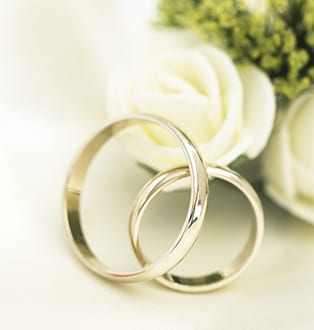
WEDDING RING GUIDE
How to Choose The Colour?

Yellow Gold: The warm look of yellow gold welcomes you with a sunshine brightness. It is classic yet fashionable, and the good effect stays true over time. The natural, beautifully sparkling yellow colour suits perfectly any style and is perfect for classic lovers because it has never gone out of style. The constant shiny appearance is for a lifetime, just like your marriage. The timeless quality will be on your finger forever.
Yellow Gold Wedding Rings

White Gold: The whiteness of white gold adds a contemporary and unique look. Its durability is substantial, and it is an excellent alternative if your budget is limited. White gold offers a calm and sophisticated gleam, and its popularity has continued for years. The reflective appearance of the surface provides an original and elegant luxury. The futuristic, modern and gorgeous look shows your confidence.
White Gold Wedding Rings
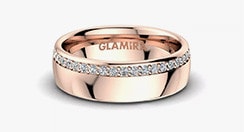
Rose Gold: The bright and stylish pink tone is very popular with its soft and elegant look. Its copper alloy gives the metal a beautiful pink shade and its trend is rising day by day. Rose gold represents love with its romantic appeal, provides a feminine look and the copper adds durability to the metal. The vintage style wedding bands look great because the enchanting beauty provides truly an amazing appeal for every ring style.
Rose Gold Wedding Rings
How to Choose The Finish?

Polished

Vertical Brushed (Matte)

Horizontal Brushed (Matte)

Wire Brushed (Ice Matte)

Sandblasted
Polished: Polished finish rings are the most well-known classics and are very common in jewellery. It has a shiny and reflective effect. If you want an eye-catching piece, a polished finish is an excellent option with its high reflection and mirror-like effect. The light reflection is relatively high with the bright and shiny exterior of the surface.
Vertical Brushed (Matte): The timeless Vertical Brushed Matte finish provides a coated paintbrush touch and the elegant matte appearance is gaining popularity day by day. The recognizable appearance and sheen diffusion creates a great surface look. The brush stroke appearance covers the surface vertically along the band and provides a slightly dulled look but also has a distinct in the strokes. The refined look offers an elegant aura to the wedding ring.
Horizontal Brushed (Matte): The subtle effect provides a tactile surface for horizontal brushed matte finishing. It is getting popular among young couples who like a unique look. The heavy texture offers a fully customised frosted effect.This finishing provides a new spin and a cool style for wedding bands. The horizontal brush stroke creates a beautiful contrast with highly polished inner side.
Wire Brushed (Ice Matte): This finish is one of the newest trends with its beautiful wire brush finish. The difference between brushed and wire brushed is wire brushed finish has a deeper noticeable brush marks and its effects are heightened so it provides a smooth look.
Sandblasted: Sandblast finish has a quite noticeable and a coarse finishing.When you touch the surface, you can feel the finishing effect easily. Sandblasted rings have a slight grainy feel and offers a textured feeling.
How to Choose The Thickness?
The width and thickness are connected; therefore, when you make the ring width wider, you also need to increase the thickness.

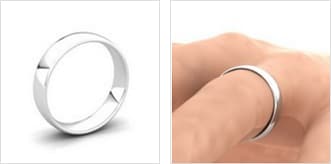


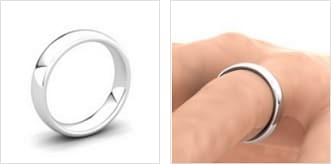
1.2 mm
1.4 mm
1.6 mm
1.8 mm
2.0 mm
1.2 mm: This thickness is thin and very sensitive. If you like a humble but elegant look, this thickness is ideal. The finest designs look great with this slim thickness. In addition, if you want light rings and do not like the heavy feeling, this thickness is suitable for you.
1.4 mm: This thickness looks great for classic designs.If you have a big and a bright engagement ring, this thickness is ideal to obtain a great combination because it does not affect the sparkling look of your engagement ring moreover it supports the shining effect and adds extra shimmer.
1.6 mm: This thickness is very common and is generally preferred by couples because it is ideal for any wedding band style and looks great on the finger. It shows the design very well and also perfectly reflects the different finish effects.
1.8 mm: Slightly thicker when you compare with the other thicknesses and gives an elegant appearance to the stone for the woman’s wedding ring while providing a spark due to the increased thickness. If you like to feel the ring, with a clean look, this thickness is ideal for you.1.8mm thickness provides a great support and also the security and durability with a strong setting.
2.0 mm: If you have long fingers, this thickness creates a great look to show the beauty of all styles. The bold band provides a strong support. If you like showing off and like a delicate but more substantial feel, this thickness is very suitable for you. 2.0mm thickness is an excellent choice for optimum support and durability.
How to Choose The Width?
If you have small and delicate hands with small ring sizes, a thin wedding band will look great on your finger. The simple and classic style also looks great on a thin-width wedding ring. If you want to show the decoration of your wedding band and see the small details, in that case, the medium-thick wedding bands are a great option. If you have long fingers with big ring sizes, the thick-width rings are the best options. Thick wedding bands beautifully show simple or detailed styles because they have a broader surface for small decorations and a delicate surface for simple and plain styles. You can select the same width with your engagement ring or create contrast and combine two different widths. The slim one or a wider one? The choice is all yours according to your taste.

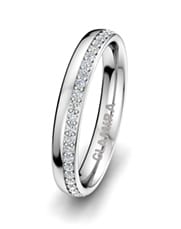


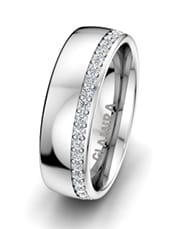

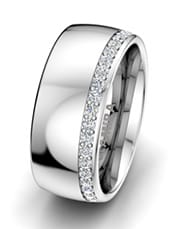
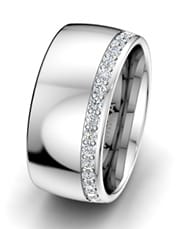
2.0 mm
3.0 mm
4.0 mm
5.0 mm
6.0 mm
7.0 mm
8.0 mm
9.0 mm
How to Choose The Profile ?

Comfort fit

Flat Band Comfort Fit
Comfort fit: This profile makes the inside of the band slightly domed with extra metal. It easily provides a squeeze over the large knuckle when wearing on your finger or taking it off. The rounded interior (where the ring touches the finger) helps the ring slide. If you have an active life and take your wedding band off very often, a comfort width wedding band must be your ideal choice. Comfort wedding bands become thicker from the centre of the band’s interior to its outer edges and covers less skin surface area.
Flat Band Comfort Fit: This profile’s inner surface has a curved and domed shape, but the outer shell has a flat shape. The convex curve helps you wear the ring quickly, so it perfectly slides when you wear or take it off. It provides easy removal, but at the same time, it has a flattened surface, so these two shapes are embedded in one design and create a unique and different look.
